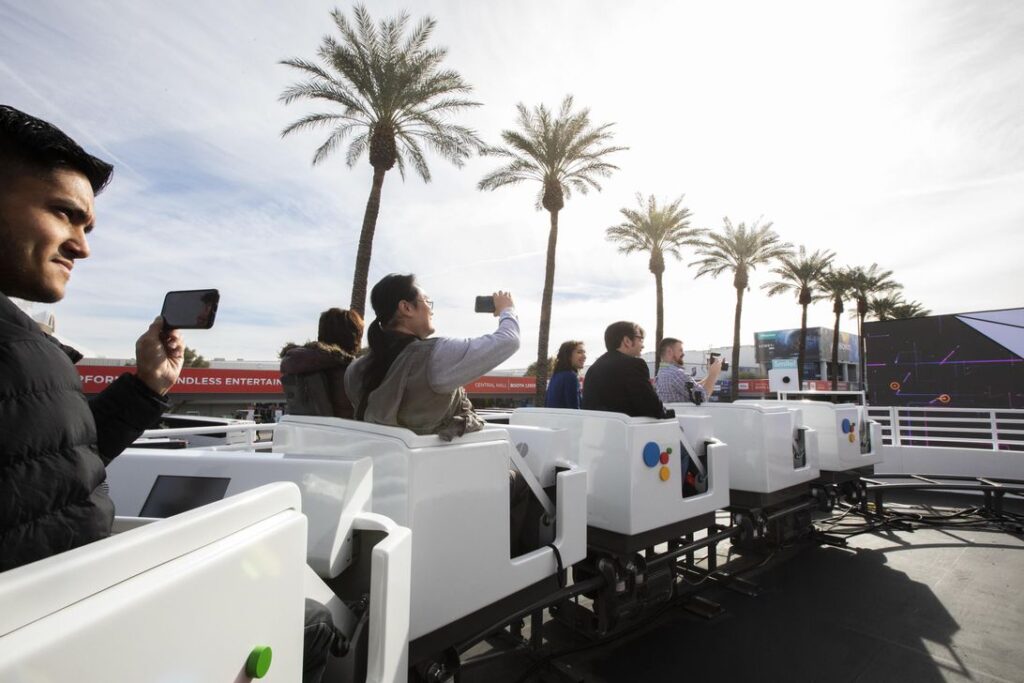Google installed an actual ride in its booth back in 2019.
James Martin/CNET
This story is part of CES, where our editors will bring you the latest news and the hottest gadgets of the entirely virtual CES 2021.
One of the biggest disappointments from CES 2021 going virtual will be the lack of a splashy booth by Google. Whether you cared about the company’s bevy of Google Assistant-related announcements, it was hard to deny the stagecraft employed by the tech giant.
For the last few years, Google boasted some of the most eye-catching CES booths, from a theme park ride in 2019 to an escape room back in January’s show. Unlike other CES heavy hitters, like Samsung or LG, Google opted to place its typically massive “activations” in the parking lot in front of the Las Vegas Convention Center, suddenly making that a trendy spot to place a booth.
Google’s booths largely pushed the benefits of Google Assistant, underscoring the importance of the digital assistant as it scrambled to claw back market share from Amazon’s Alexa, which had a head start in the area thanks to Amazon’s array of Echo speakers. Indeed, Google and its Assistant were part of a battle waged over digital assistants at past CES shows, with extravagant booths and with partners announcing that their respective assistants would come embedded in a new television, car or some other gadget.
But with CES going virtual, a move dictated by the ongoing coronavirus pandemic, many of the show’s biggest names are opting to skip the show. Google will hold partner meetings, but it won’t have a large presence at the show, according to a spokesman. It’s not alone — the Consumer Technology Association said it expects about 1,000 exhibitors at the virtual show, less than a quarter of the total from the January confab.
As a reminder of what you’re missing, here’s a look back at some of the past Google exhibitions.
2020: Google’s escape room
The company’s attempt to promote its digital assistant likely peaked in January during CES 2020, with an escape room where the only way to get out was to employ Google Assistant (talk about a captive audience). Google made its presence felt earlier this year in the parking lots of Vegas’ convention center with a two-story funhouse that drew long lines throughout the week.

Google “trapped” its guests, requiring them to use Google Assistant to make their way out.
James Martin/CNET
This was the escape room’s premise: You’re meeting with investors (how Silicon Valley) for dinner, and they want you to serve a specific dish: bacon and Brussels burrata di bufala risotto burritos. You go about your day using the Google Assistant to help you navigate to the market, preheat the oven and put on music for dinner.
You couldn’t accuse Google of phoning it in. Part of the experience included being in a car to use Assistant.
2019: The theme park ride
This was a favorite moment of Google’s venture into CES. At a show known for crazy attractions — BMW had taken riders on a drifting experience in the same parking lot just a year earlier — Google may’ve topped everyone by bringing its own version of “It’s a Small World” by way of a tongue-in-cheek theme ride.
Google was taking it too seriously. The PA system welcomed riders by noting that the gimmick was “part ride, part marketing stunt, let’s be honest with ourselves.” But the fun ride had a serious point to make about Google Assistant’s interpreter mode, which was announced as the show opened.

Google went all out with its setup in 2019.
James Martin/CNET
This was also the year Google really made its presence known, plastering “Hey Google” — one of the trigger phrases for Assistant — all over Las Vegas, including near one of the main entrances of the convention center and on the monorail that connects the venue to many of the casinos on the Strip.
At the show, Google announced a slew of offerings, including a new smart clock manufactured by Lenovo and a new platform that aimed to make it easier for device makers to add the Assistant to their gadgets.
2018: A three-story playground
Google was just getting going with its massive booths. This one included multiple rooms showing off different devices powered by Google Assistant, and was capped off with a twisting slide off the third story. It seems quaint now, next to the theme park ride, but back then it made waves at the show.
In a bit of a meta touch, the giant booth itself included a bunch of smaller, mini booths: phone booths turned into mini art projects that each showed off a capability of Google Assistant, from playing music to fielding trivia questions.
This marked the first big year for Google at the show.

Google’s 2018 booth was part fun house, part pitch for Assistant.
Sarah Tew/CNET
2017: Lots of news, lower-key presence
You can cut Google some slack for laying relatively low at this show. This was the first CES since Google unveiled its Google Home smart speaker, the first device to house Google Assistant. Rather than offering a large exhibit, Google let partnership announcements take center stage and prove that it was building momentum to take on Amazon’s Alexa. Companies including Belkin, Hyundai, Chrysler and Nvidia all offered support for Assistant.
Google Assistant was more of a curiosity and a project back then. Now that it’s far more widely spread — embedded into Android phones as well as the increasingly popular line of smart speakers. The digital assistant is a more serious player. Had CES remained a physical event (which in this environment would’ve been a terrible idea), Google likely would’ve pulled off another attention-grabbing setup.
We’ll have to wait until CES 2021 to see what Google has up its sleeve next.

